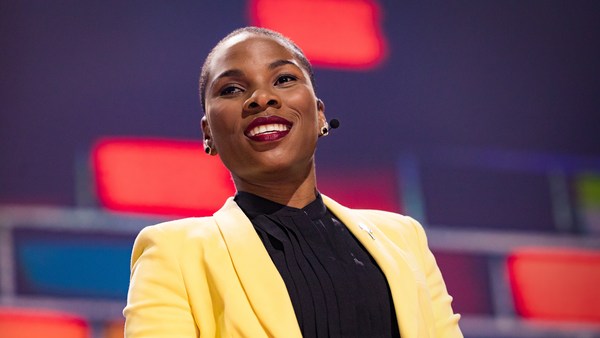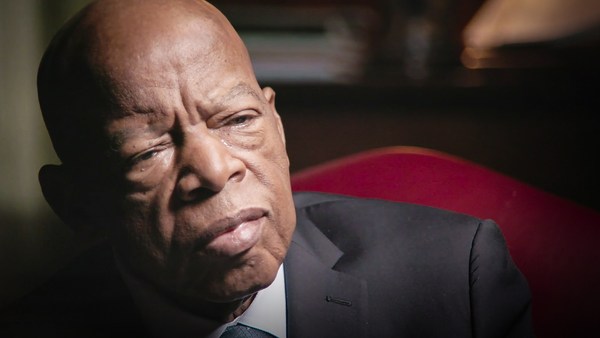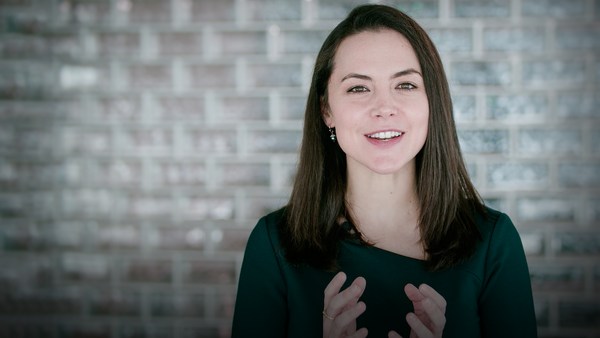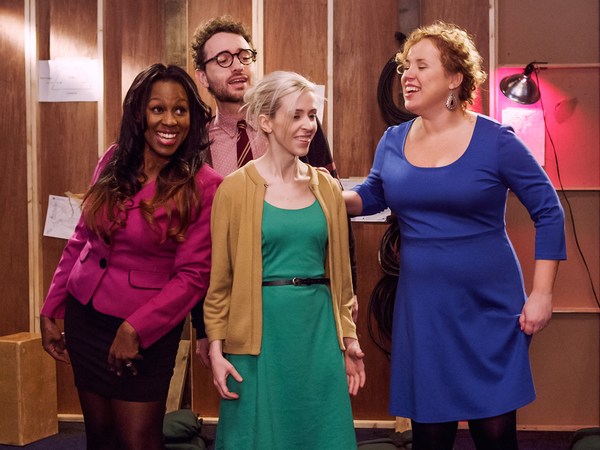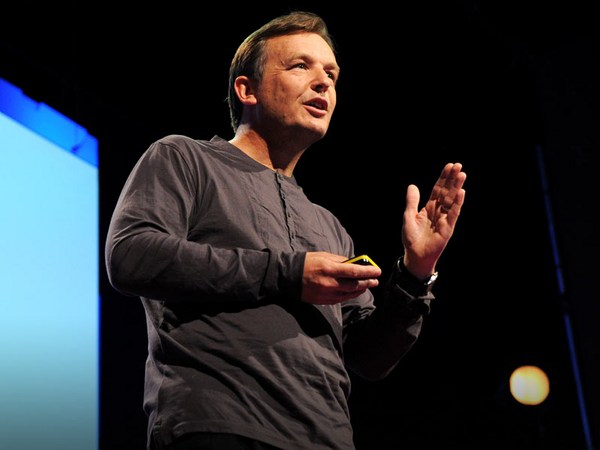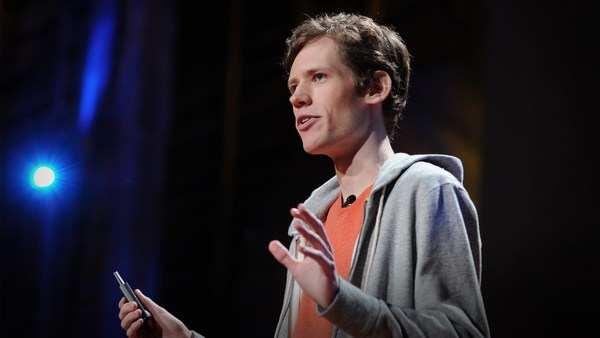Whitney Pennington Rodgers: Each of us, no matter who we are, have dreams for ourselves. and all of us also have fears. Luvvie Ajayi Jones has spent lots of time thinking about the intersection of these two things, namely, how you can overcome your fears to accomplish your dreams. Here to break this all down for us is Luvvie Ajayi Jones. Welcome, Luvvie.
Luvvie Ajayi Jones: Hi!
WPR: Hi, Luvvie. How are you doing?
LAJ: Doing well. Doing well.
WPR: Why do you use the term "professional troublemaker" to describe yourself? Why is that sort of the term that you've landed on to define what you are, who you are?
LAJ: Yeah. You know, some of us have been called troublemakers growing up. When you are too loud in the class or, you know, your mom tells you to eat vegetables and you say no, and you're like, you're a troublemaker. I want to reclaim what that means. I think about the late, great John Lewis, who said we have to be ready to make necessary trouble, good trouble, and really was the lens of: we are going to have to do things that are going to disrupt the status quo in this world. If we're going to do anything of impact and of note and make any type of positive change, we are going to have to "make trouble." And making trouble is not about being a contrarian randomly. It's not about being a troll. It's not just simply because you want to make people uncomfortable. It's that, often, when you are the person who thinks different from everybody else in the room, it does feel like trouble. You know, when you are not going along with the group, it feels like trouble. But sometimes, it's actually what you need to do to not just honor yourself, but honor the world and honor who you want to be. So if making trouble looks like we actually end up being better off for it, then we have to make trouble. I think it's an obligation for us to make trouble, the type that leaves our kids better, that leaves the rooms that we are in elevated, the types that lets us be proud of ourselves.
Now, making trouble will not always go well, right? Let's keep -- I'm going to say that. It's not that when you speak the truth, somebody's going to always receive it properly. But you go to bed knowing that you at least tried, as opposed to saying, "What if I had tried?" It's a life of, "Oh, well," then "What if?" So I think that's why professional troublemaking is something that we should be proud of.
WPR: So I know everyone is dying to know: How how do I become a professional troublemaker? You outlined this in your book. You talk a little bit about it in your talk. But I know there are three big things that you think you need to do to approach this idea of becoming a troublemaker. Will you share a little bit about that with us?
LAJ: Yes. So when you are in the room, and somebody says something that is not a great idea -- we've all been in meetings like that, where a campaign idea was brought forth or a slogan or just something, and you're just like, "Oof," but everybody else in the room is like, "This is a great idea! We love it! Yes, let's do it!" And usually you feel like you're standing on an island by yourself, because you're like, "If I'm the only person that has a problem with it, am I the problem?" So then oftentimes, we'll be quiet, the room will dissipate, we walk out, and we keep thinking about that moment, and we keep saying, "Should I have said something?" I don't like the feeling of thinking, "Should I have said something?" Because I'll sit on it, and I'll overthink it, and I'll think about it the day after, and I'll be like, "I should have said something."
So for those tough moments where you want to say something that feels like it's contrary to what everybody else is saying but you know you deeply believe it, I say ask yourself three questions. And if the answer is yes to all three, you say the thing. OK, so the three questions are: Do I mean it? This question is important because you're not just talking to hear your own voice. Do you actually mean what you're about to say? Can I defend it? OK, if somebody challenges you on this thing that you are also challenging, do you have a way to justify and back it up? Do you have a clear way to say, "These are the receipts I'm coming with"? And then: Can I say it thoughtfully? Because how you say it does matter. Now, it does not mean that you should be tone-policed, nor does it mean that everybody will think you're saying it thoughtfully. But if you at least try to run it through your own, "Am I trying to be as thoughtful as possible?" it's risk mitigation. So you're saying, "OK, I'm not going to be hateful about this. I'm not going to say this to demean somebody. And I'm not just saying it to blow the room up or make the room feel like a rocky place to be in." When the answer is yes to all three -- Do I mean it? Can I defend it? Can I say thoughtfully? -- say it, and then deal with whatever comes. Now, again -- I say risk mitigation. I'm not saying everybody will receive what you're going to say with the intention you meant, OK? But it is a way to check yourself, check in with yourself, check what you're about to say, check your tone a little bit so it doesn't come out as unthoughtful as it could. Because there are moments when things might be heated and you might want to speak really quickly. It slows you down just a little bit to say, all right, all right, you do want to say this thing, it is valid, but don't come at this person's neck. So I think it's important for me. It's a checkpoint that I've used for years that I kind of lead with. And most of the time it goes well.
WPR: That is part of the tenets you outline. This is part of the "be" part. You have "be, say, do" -- Is that right? -- for tenets.
LAJ: Yes. Be, say, do.
WPR: Be, say, do. And Ahmed, he asks, "How do you recognize professional trouble rather than regular trouble?"
LAJ: I think it just really comes down to the heart from which you're doing it. You know, I really do think professional troublemaking, what it means is to disrupt for the greater good. You're not just disrupting because you don't like the person that's sitting across from you. You're disrupting because you know what you're saying or doing is going to be better for somebody else or somebody who looks like you or somebody who doesn't even look like you, right? It is ... it's mission-driven. And it is sometimes brave, because a lot of troublemaking is going to be scary. If it's not scary, it's probably not troublemaking, right? If it does not give you a little bit of, "Uhh ... I'm about to do this," it's probably not troublemaking. Because if it was easy, everybody would do it. If something was easy to say or do, everybody would do it, so it wouldn't be special.
So I think a lot of times about troublemaking the thing to really understand is: it's going to be scary. But what we sometimes will think is that if it's scary, that means I need to not do it. That's not true. That's how we end up not living the lives that we want to live. That's how we end up passing on opportunities that are meant to transform our lives. That's how we end up regretting our silence in rooms. One of the things that I actually ask myself whenever I'm in a room and I feel like I need to say something that feels tough is, I also ask myself, "Will my silence make me proud? This thing that feels like trouble, if I don't do it, will I be proud of myself?" Because ultimately, we are all our own biggest critics. Like, I could disappoint other people and still be able to deal with it. But when I disappoint myself, it's really tough. So I'm always like, "I'm making trouble so I don't disappoint myself. I'm making trouble so my silence is not something that will convict me." Because if I was there, I have to justify what I did in any room. And I want to be able to say, "At least I tried."
WPR: And to this point, Dennis asks, "How do you pick your battles to maintain your energy every day? How do you decide which trouble's worth making?"
LAJ: Great question. Sometimes, I just ... don't have the energy to make trouble on that day. What that means is, if I am in a meeting, and on that day, I'm wiped, and I'm just like, "I don't have the energy to even be the one that's challenging," on that day, I might be quiet. So I just need more people to feel the obligation to also make the good trouble, so the one person who's always doing it can take a rest.
WPR: I mean, it sounds like a big part of this is understanding yourself, right? Is understanding the sorts of things you want to go after. And we have an anonymous question where somebody asks, "I think being a troublemaker also requires us to identify what we truly want. What's your advice on finding out what you want?"
LAJ: Yeah, I think it's important to know what your core values are and what the thing that you will fight for is, which is why I started the book with a chapter called "Know Thyself." That was important because we have to be doubly clear on who we are, what we hold dear, why we are who we are, because it's what's going to inform what we want to speak up about. It's what's going to inform what drives us to fight. It's what's going to inform the why of it all. It's what pushes you past the fear to say, "I have to do this anyway." So if you're not clear about who you are and what's important to you, you're going to find it hard to know, "What am I actually going to be standing up for?"
WPR: You've gone back to these tenets, then, in answering this question, this idea of being the troublemaker that you want to be. And then what you shared earlier is the saying of the asking the three questions. And then there's a third part of this, the doing element. Could you talk a little bit about what that looks like?
LAJ: Yeah, you know, you can talk a good talk, but if you're not doing work, then what's the point of the talk? Ultimately, we have to put action to our beliefs, to our ideas, to our convictions. So you can be like, yes, you know, Black lives matter. But if you're a boss who hasn't promoted your most senior Black staff, and somebody who just started got promoted over them, then the words that you said did not matter. So the "do" of it all is important; it's an exclamation point, because first you fix your mindset with the "be," then you start putting words to it with the "say," and then now you actually put action to it with the "do." And we cannot have the other two without the do. I think what ends up happening a lot is that people feel really good about what they said, but they haven't made it actually match with their action. So be who you say you are, you know, whether people are watching or not. Be who you say you are in private and in public, in the rooms where it's easy and in the rooms where it's tough and you face opposition. Because a lot of us are walking with privilege that we're not using. So every day you're trying to figure out in what ways can you use your voice, your access, your social currency in service of people who don't have it as much as you do.
WPR: So, Anushka, she asks, "As someone who's young and often seen as inexperienced, how do I gain the space to speak and have others realize my worth?"
LAJ: You won't gain the space to speak. People won't let go of their power that they perceive. Basically, you have to take it. Now, that means you might have to interrupt and say, "Hi. I've been trying to speak for the last 20 minutes. I have a point of view that I'd love to offer up." It is being -- it is taking up space even when people don't give it to you. And it does not mean you're going to be rude. It doesn't mean you're going to be arrogant. It means your voice is necessary, just like everybody else's. In the places where your voice is not given space, sometimes, you either have to take it, or you walk away, knowing that's not the space for you. Because if you have to constantly fight to be heard, that's exhausting. People might look at you with all types of weird projections of what they think you do or don't know. Do not let it shift what you see as your own value. That is also why you cannot attach your value to how other people are treating you or how other people are projecting things onto you. If you do that, you will very quickly be told that you don't fit into spaces. You'll be very, very quickly told that you're not worthwhile or that your ideas are terrible, and then you will absorb it. And then you'll go, like, "Oh, I guess I won't use my voice." You got to fortify yourself and know that your voice is just as important as anybody else's in the room and that you as somebody who's learning, who's growing, who is already in the room, you have already proven yourself to be valuable. And whether or not people see it is not ... it's not your fault, but affirm yourself and make yourself known. You know, take up space, even if they're not giving it to you, don't wait for their permission to speak. Be brilliant whether or not they want you to be.
WPR: Well, thank you so much, Luvvie, I know we're all going to be waiting with bated breath for the news around this book.
LAJ: Thank you so much for having me. TED has been so significant in my journey.
